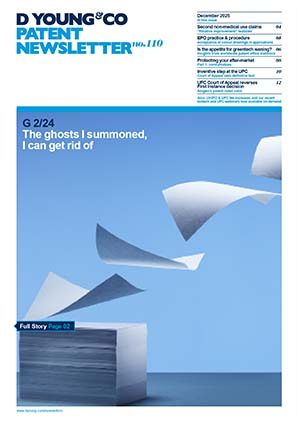UPC crosses borders and breaks boundaries: long arm jurisdiction questions arise again!
The Düsseldorf Local Division recently handed down a decision that has sent reverberations throughout the EU patent landscape and beyond. In its decision, it was determined that the Unified Patent Court (UPC) has jurisdiction to hear infringement actions concerning European patents validated in non-UPC contracting member states. We delve into the details of the decision to understand its potential implications.
Case background
Fujifilm Corporation is pursuing a group of Kodak companies for infringing several European patents relating to offset printing technology. Two infringement actions have been initiated before the UPC’s Mannheim Local Division, while a third case (ACT_578607/2023; UPC_CFI_355/2023) was filed at the Düsseldorf Local Division over the alleged infringement of EP3594009. In the latter case, Kodak filed a counterclaim for revocation by way of response. The European patent in question was in force in both Germany and the UK, while all parties to the proceedings were domiciled in Germany (a UPC contracting member state).
Decision of the Düsseldorf Local Division
In its decision, the Düsseldorf Local Division found the European patent to be invalid under the European Patent Convention (EPC), having rejected Fujifilm’s request to amend the patent. While the Düsseldorf Local Division recognised that it did not have jurisdiction to revoke the UK part of the patent, which presently remains in force, the German counterpart was revoked. Nevertheless, while no UK-based revocation action had been filed, the Düsseldorf Local Division held that the grounds for invalidity would also apply to the UK part of the patent, but had no jurisdiction to revoke the “UK-part of the patent”. However, the Düsseldorf Local Division considered that it did have jurisdiction to determine infringement of the UK part of the patent and therefore apply remedies in respect of the infringing acts conducted in the UK.
One may assume that revoking the patent in suit would negate the need to consider infringement. However, the Düsseldorf Local Division did so anyway, carrying out a legal analysis of whether the UPC had jurisdiction to hear and enforce judgments concerning infringing acts in states that are not UPC contracting member states.
Both Fujifilm and the Kodak presented arguments regarding the jurisdiction of the UPC in relation to the UK.
Fujifilm asserted that the UPC does have jurisdiction over both German and UK parts of the European patent, on the basis that all parties to the proceedings were domiciled in Germany. Notwithstanding this, Fujifilm also argued that the Düsseldorf Local Division should at least consider infringing acts committed whilst the UK was still a member state of the EU, as it was until the end of the transition period which ended in December 2021. Kodak countered that the UPC lacks jurisdiction over the European patent insofar as it relates to the UK, given it is not a contracting member state of the UPC. Thus, the territorial scope of a UPC decision cannot be extended to the UK (neither an EU nor a UPC member state).
In respect of its decision on the question of infringement/enforcement, the Düsseldorf Local Division sided with Fujifilm, rejecting the suggestion that it did not have jurisdiction with respect to the UK. Indeed, the Düsseldorf Local Division held the relevant provision of the UPC Agreement (UPCA) does not exclude decisions having effect beyond the territory of the contracting member states. The Düsseldorf Local Division relied upon the UPCA and Brussels Ibis Regulation in finding that, where defendants were domiciled in a member state (Germany), they shall be sued in the courts of that member state.
In this regard, the Düsseldorf Local Division concluded that the UPC was a court of a member state for purposes of infringement proceedings. Importantly, the Düsseldorf Local Division held this jurisdiction extends to infringement actions concerning member states of the EPC, which are non-EU states, such as the UK.
Distinction was made with other third countries, such as the USA and China, where it was determined that the UPC’s jurisdiction did not extend to jurisdictions where a European patent was not valid and in force.
Strategic consideration
For patent proprietors, this decision provides an opportunity to bring all infringement claims before a single court and obtain a comprehensive relief in a single forum, whether or not the claims in question relate to UPC or non-UPC contracting member states. Thus, if this decision is left unchallenged or even upheld by the UPC Court of Appeal, it may become important to consider designating territories, upon granting of European patents, where said territories are EPC contracting states but not UPC contracting states, such the UK, Switzerland, Spain, Poland, Croatia, or Turkey. Infringement actions may be initiated against EU-domiciled defendants, although it appears from this decision that obtaining remedies may be limited to those EU-domiciled states without parallel national validity proceedings.
In light of the decision and potential uptick in infringement claims based on acts carried out in non-UPC contracting member states, it will be interesting to see how the respective national patent offices and courts respond, given the apparent encroachment on their jurisdiction.
Considering the impact on national sovereignty, it will be interesting to see whether national courts or governments seek to proactively counter any perceived threat of the UPC’s long arm jurisdiction.
Interestingly, the Düsseldorf Local Division’s decision also sets up a potential scenario where infringement proceedings and revocation actions concerning patents in non-UPC contracting member states may become bifurcated between the UPC and national courts of non-UPC member states. While the Düsseldorf Local Division’s observation that the UK patent in suit would lack validity in the UK is an interesting one to make, it is by no means assured, particularly given the standard applied was that of the EPC, as opposed to relevant national law. This may result in a reduced quality of outcomes for litigants of bringing infringement actions before the UPC if not carefully considered from the outset. Indeed, risks associated with anti-competitive behaviour in this regard could have detrimental consequences.
UPC jurisdiction
The “long arm jurisdiction” legal concept was discussed long before the UPCA came into force. This concerns the extent to which the jurisdiction of the UPC can be extended to member states of the EPC, which are not contracting member states of the UPC. It is of particular interest because not all member states of the EPC are member states of the UPC, and also in respect of the UK which withdrew from the UPCA in 2021, as well as Spain or Poland which are not contracting member states of the UPC.
If the UPC’s Court of Appeal upholds the First Instance Court’s decision, parties may be able to bring infringement actions before the UPC concerning acts that infringe a European patent, irrespective of whether the states in question are UPC contracting member states.
This can only increase the attraction of the UPC for parties which have thus far opted-out of the UPC.
The only conditions would appear to be that the European patent is in force and the infringing parties are themselves domiciled in a UPCA contracting member state. These requirements broadly mirror those of the recent French Supreme Court decision (21-11.085), where it was found that the French courts have jurisdiction to rule on patent infringement matters beyond France’s borders, providing the claimant and some of the defendants are based in France.
Moreover, similar questions form the basis of the pending BSH/Electrolux case before the Court of Justice of the European Union (CJEU) (C‑339/22), where the opinion of the Advocate General is that the Brussels Ibis Regulation provides sufficient basis for a court to hear an infringement action in relation to a European patent in force outside its territory.
Notwithstanding this, we have also seen the UPC Court of Appeal quash the First Instance Court’s appetite to extend the UPC’s jurisdiction in the recent Abbott v SiBio case (UPC_CoA_388/2024). In this decision, the Court of Appeal quickly and decisively clarified that the UPC’s jurisdiction does not extend to states that have not ratified the UPC Agreement.
It remains to be seen whether Fujifilm or Kodak appeal the Düsseldorf Local Division’s decision. Nevertheless, it seems that the CJEU’s decision in C‑339/22 may prove to be instrumental in reshaping how the UPC and other national courts conduct themselves in relation to European patents in force in other jurisdictions. It goes without saying that the implications could be profound from a legal certainty point of view, but also politically as well.
Naturally, this subject is becoming increasingly interesting and we will report any updates as events unfold.
Related articles and useful links
- Düsseldorf Local Division, UPC_CFI_355/2023 (PDF): dycip.com/upc-cfi-355-2023
- EP 3 594 009 (PDF): dycip.com/ep3594009B1
- French Supreme Court decision 21-11.085: dycip.com/fr-supreme-21-11-085
- CJEU, BSH Hausgeräte, case C-339/22: dycip.com/c-339-22
- Advocate General’s opinion, C-339/22: dycip.com/ag-c-339-22
- Abbott v SiBio UPC Court of Appeal, UPC_CoA_388/2024 (PDF): dycip.com/sibio-abbott-aug24
- UPC Court of Appeal corrects course for provisional measures in Abbott v SiBio,
23 August 2024: dycip.com/abott-sibio-aug2024



